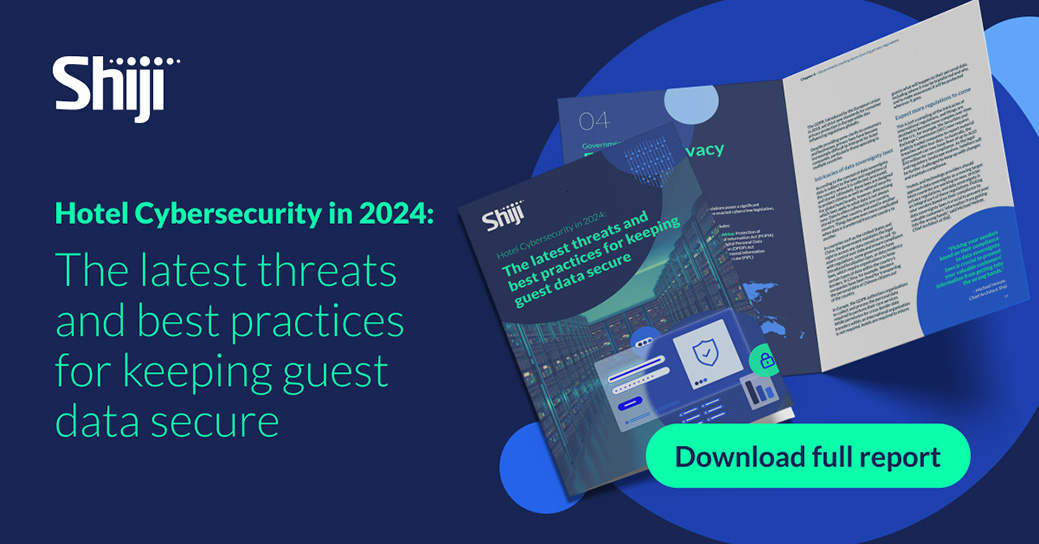

In today's digital landscape, cybersecurity has emerged as a critical concern for businesses across all industries. Nowhere is this more evident than in the hospitality sector, where the safeguarding of guest data is paramount. Drawing from a comprehensive white paper authored by Shiji titled "Cybersecurity: A Company-wide Responsibility," this article delves into the evolving cybersecurity landscape within the hotel industry, highlighting the imperative for a collective and company-wide approach to cybersecurity.
The Urgency of Enhanced Cybersecurity Measures
A prime example of the urgent need for heightened cybersecurity measures within the hospitality sector is the Vancouver hotel incident outlined in Shiji's white paper. On a quiet Christmas Eve, the hotel's network came to a grinding halt, heralding the onset of a nightmare scenario. Threatened by hackers demanding a hefty ransom, the hotel faced chaos and disruption, ultimately necessitating a migration to a modern cloud-based platform. This sobering tale underscores the profound impact that cyber breaches can have on hotel operations, guest trust, and financial stability.
Rising Threats in the Hospitality Industry
The white paper further illuminates the rising threats facing hotels worldwide, as evidenced by a wave of data breaches that plagued the industry in 2023. From MGM Resorts International to Munich-based Motel One Group, no hotel entity is immune to the menace of cyberattacks. The infiltration of niche, mid-sized hotel companies underscores the pervasive vulnerability within the industry, prompting a collective call to action for heightened vigilance and proactive cybersecurity measures.
Mitigating Risks: Compliance and Regulation
Central to the discourse on cybersecurity in hospitality is the acknowledgment of the multifaceted risks posed to both hotels and their guests. When threat actors gain unauthorized access to guest data, the repercussions are far-reaching, encompassing identity theft, financial fraud, operational disruptions, revenue losses, and legal ramifications. Mandatory breach disclosures, coupled with the specter of bad publicity and damaged reputation, further underscore the urgency for robust cybersecurity protocols.
Navigating the Complex Regulatory Landscape
As hotels navigate the intricate web of evolving privacy regulations, the white paper sheds light on the complexities of data sovereignty laws and the imperative for compliance across multiple jurisdictions. With regulations such as the GDPR setting stringent standards for consumer privacy protection, hotel companies face the arduous task of harmonizing disparate legal frameworks while ensuring the secure collection, storage, and usage of guest data.
Technological Innovation and Vulnerabilities
Furthermore, the white paper elucidates the symbiotic relationship between technological innovation and cybersecurity vulnerabilities within the hotel industry. While technological advancements have undoubtedly enhanced operational efficiency and guest experiences, they have also expanded the attack surface for cybercriminals. Legacy systems, self-service applications, and the proliferation of IoT devices present ripe targets for malicious actors, necessitating a proactive approach to cybersecurity hygiene and risk management.
Empowering Employees as Frontline Defenders
In response to these challenges, the white paper advocates for a holistic and company-wide approach to cybersecurity, emphasizing the pivotal role of employee awareness and education. Staff must be empowered to act as the first line of defense against cyber threats, underscoring the imperative for continuous training, updates on emerging threats, and adherence to cybersecurity best practices.
Preparing for the Future: Evolving Threat Landscape
Looking ahead, the white paper foresees a future where hotels must remain vigilant against increasingly sophisticated cyber threats driven by automation and artificial intelligence. As the threat landscape evolves, so too must hoteliers' cybersecurity strategies, fortified by collaborative efforts, technological innovation, and a steadfast commitment to guest data protection.
Conclusion: A Collective Responsibility
In conclusion, cybersecurity is not merely the purview of the IT department; it is a company-wide responsibility that demands collective vigilance, proactive measures, and unwavering commitment to safeguarding guest data and preserving trust in the hospitality industry.
Download the White Paper - Cybersecurity: A Company-wide Responsibility







